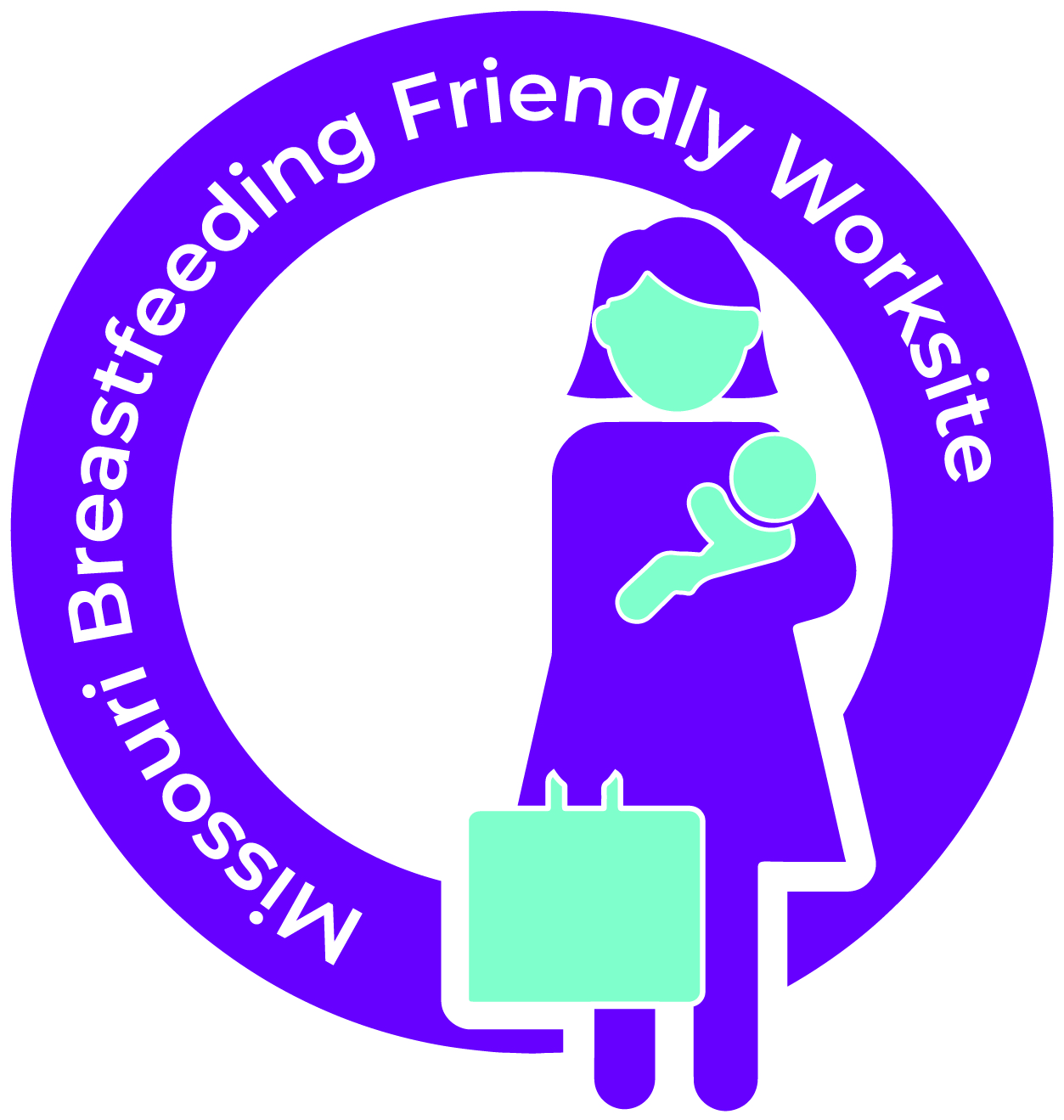Missouri Supports Breastfeeding

Missouri is invested in building breastfeeding friendly communities. Mothers who choose to breastfeed are more successful when they have support from health care providers, hospitals, businesses, child care providers, family and friends. Missouri provides recognition for businesses, child care providers and hospitals who make the choice to be breastfeeding friendly. Missouri also encourages all businesses to welcome breastfeeding families and provide a supportive, family friendly environment. This page will tell you more about:
The Breastfeeding Friendly Worksite Program
The Missouri Breastfeeding Friendly Worksite Program is a collaboration between the Missouri Department of Health and Senior Services and the Missouri Breastfeeding Coalition to educate employers on the value of providing lactation support in the workplace and to recognize businesses that support their breastfeeding employees.
Employer support of breastfeeding provides many benefits to businesses:
- Cost savings of $3 per $1 invested in nursing support.
- Reduced absenteeism to care for sick children because breastfed infants have less illness.
- Lower health care costs.
- Improved employee productivity with higher morale and greater employee loyalty.
- Increased ability to attract and retain valuable employees.
- Family-friendly image in the community.
Women who return to work while continuing to breastfeed need the support of their employers. Their needs are simple: a safe, private and comfortable location at the worksite and the opportunity to pump two or three times during the work day.
The Breastfeeding Friendly Worksite Award evaluates employers on criteria for three levels of support: Gold, Silver and Bronze. Businesses that meet one of the three levels will be recognized in their community and statewide. View the list of businesses recognized as a Breastfeeding Friendly Worksite.
Businesses can become a breastfeeding friendly workplace by:
- Identifying and setting up a suitable private pumping room.
- Allowing appropriate breaks for nursing employees.
- Reviewing written policies.
If you need help implementing these changes in your business, reach out to Missouri’s breastfeeding team at breastfeeding@health.mo.gov to discuss how to support your employees.
To view the criteria or to apply for the award, complete the application and submit it to the email address on the form. Resources available with this award include The Lactation Support Survey, PowerPoint Presentation*, Sample Elevator Pitch, Press Release and Worksite Policy. Watch a video about an employer’s perspective on accommodating breastfeeding in Colorado.
*Created by the Kansas Breastfeeding Coalition. Used with permission.
The Breastfeeding Friendly Child Care Program
Please view the Breastfeeding Friendly Child Card program page for more information about how child care providers can successfully support breastfeeding families.
The Missouri Breastfeeding Welcome Here Program
Please view the Missouri Breastfeeding Welcome Here page to pledge your business’s support for breastfeeding families and to see a list of businesses that welcome moms to breastfeed at their location.
The link to health care providers and breastfeeding
Hospital practices and health care provider offices have a huge impact on a family’s infant feeding decision and the success of breastfeeding. As a health care provider, your role is to educate and encourage women to breastfeed and then support them in reaching their infant feeding goals. You can also serve as a breastfeeding champion in your community or at your local hospital by helping moms and hospitals adopt practices to support breastfeeding.
Hospital practices for breastfeeding success:
- Breastfeed within the first hour. Babies should be put skin-to-skin immediately after birth.
- Practice rooming in at the hospital. Mothers and babies should be kept together so mothers can get to know their babies’ signs of hunger.
- Breastfeed on demand. Teach parents to recognize early feeding cues and feed their baby often.
- Give only the breast. Bottles and pacifiers often interfere with breastfeeding and cause babies to not nurse frequently enough. There’s plenty of time to introduce these after breastfeeding is established!
- Provide only breast milk. Breastfeeding exclusively builds the mother’s milk supply and gives mother and baby time to learn how to breastfeed.
Evidence-based maternity care practices
- The Baby-Friendly Hospital Initiative.
- Missouri "Show-Me 5" Hospital Initiative.
- The Joint Commission’s Perinatal Care Core Measure Set.
- Ban the Bags Initiative.
- The Academy of Breastfeeding Medicine Protocols (ABM).
- United States Breastfeeding Committee.
- National WIC Association – “NWA National Breastfeeding Strategic Plan.”
- National WIC Association-Position papers on breastfeeding and maternal and child health.
The Show-Me 5 Hospital Initiative
The benefits of breastfeeding are well established and medical authorities agree breastfeeding is the optimal way to feed an infant. Birth facility policies and practices significantly impact whether women choose to breastfeed and how successful they are in reaching their infant feeding goals. The U.S. Surgeon General’s Call to Action to Support Breastfeeding cited hospital practices as a leading barrier to successful breastfeeding.
Missouri created the Show-Me 5 Hospital Initiative to recognize Missouri hospitals who follow evidence-based maternity care practices that support breastfeeding initiation and duration. These hospitals have adopted five steps of the Ten Steps to Successful Breastfeeding of the Baby Friendly Hospital Initiative which assists mothers in meeting their feeding goals and may offer an effective path to an incremental adoption of evidence-based maternity care practices. Missouri hospitals should strive to achieve all ten steps which is associated with increased breastfeeding rates around the world.
The Missouri Show-Me 5 hospital practices are:
- Help mothers initiate breastfeeding within the first hour of birth.
- Practice “rooming in”, allowing infants to stay in the same room as their mothers.
- Give infants no food or drink other than breast milk, unless medically indicated.
- Do not give pacifiers or artificial nipples to breastfeeding infants.
- Foster the establishment of breastfeeding support groups and refer mothers to them on discharge.
The Guidelines and Evaluation Criteria provides specific information on each of the Missouri Show-Me 5 hospital practices and how to evaluate that a birthing facility meets the criteria. The Self-Appraisal Tool is used for birthing facilities to review current maternity care policies and practices in optimal feeding and help assess where their facility is in the process.
View the Missouri Show-Me 5 Hospitals page to see which hospitals have been recognized. Facilities ready to apply should complete the application for the Missouri Show-Me 5 Hospital Initiative and send it and the Self-Appraisal to the contact on the application.
If you have questions or would like a printed copy of the Missouri Show-Me 5 resource kit or poster, please contact Lisa Schlientz, the State Breastfeeding Coordinator, at Lisa.Schlientz@health.mo.gov or 573-751-6468.
The laws protecting breastfeeding mothers
The Fair Labor Standards Act (FLSA) requires employers to provide reasonable break time for an employee to express breast milk for her nursing child. Employers are also required to provide a place, other than a bathroom, that is shielded from view and free from intrusion from coworkers and the public, which may be used by an employee to express breast milk.
- Basic information and answers to frequently asked questions about worker’s rights can be found the Department of Labor’s FLSA Protections to Pump at Work page, including this handy one page guide to federal protections for pregnant, postpartum and pumping workers.
- If you are a pregnant, postpartum or pumping worker who needs legal advice about an employment situation, you may be able to get help from A Better Balance, a nonprofit legal advocacy organization that provides a free and confidential legal helpline for working parents.
- Follow this process to file a complaint with the U.S. Department of Labor’s Wage and Hour Division, which is responsible for administering and enforcing some of the nation’s most important worker protection laws.
File a complaint with the U.S. Department of Labor's Wage and Hour Division (WHD). WHD is responsible for administering and enforcing some of the nation's most important worker protection laws.
Federal laws also protect breastfeeding mothers. The United States Breastfeeding Committee (USBC) provides Breastfeeding Traveler Information that explains your rights when traveling. More information about the FAM Act is located here: S.2638 - 116th Congress (2019-2020): Friendly Airports for Mothers Improvement Act | Congress.gov | Library of Congress.

